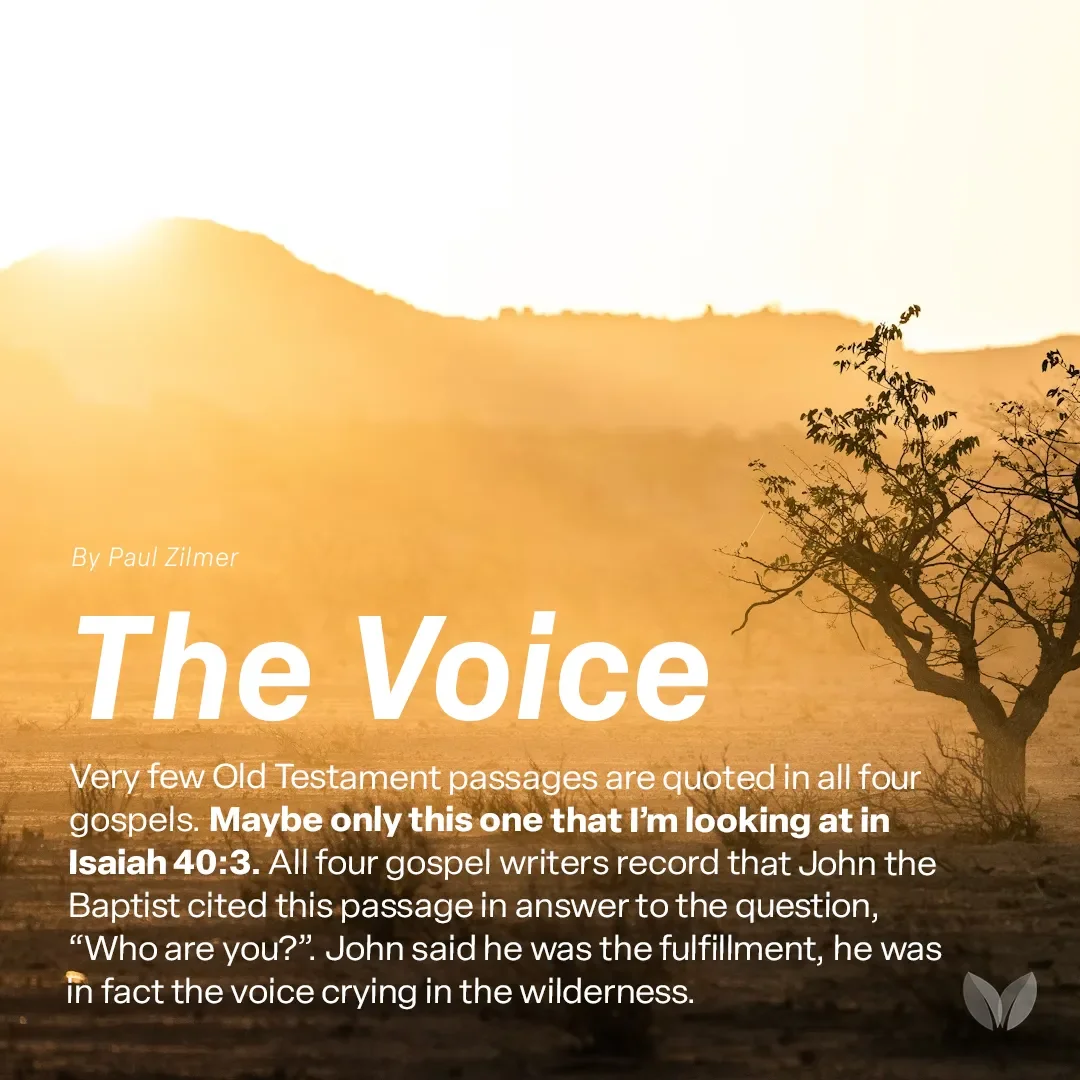The Voice
Very few Old Testament passages are quoted in all four gospels. Maybe only this one that I’m looking at in Isaiah 40:3. All four gospel writers record that John the Baptist cited this passage in answer to the question, “Who are you?” John said he was the fulfillment, he was in fact the voice crying in the wilderness.
Strongly recommended: Refresh your memory of the passage, and read Isaiah 40:1-11 right now. (Verse 12 onward starts another thought.)
When Mark quotes John quoting Isaiah, he does something the others don’t. His quote is a mashup of the verse in Isaiah and Malachi 3 verse 1: “Behold, I send my messenger, and he will prepare the way before me.” It’s pretty clear that Malachi and Isaiah are talking about the same person, even without Mark directly telling us it is. This “messenger” is identified later: “Behold, I will send you Elijah the prophet before the great and awesome day of the Lord comes.” (Malachi 4:5)
This prophecy is the reason the religious authorities questioned John the Baptist. They asked him flat out, “Are you Elijah?” He categorically said, “No.” Yet Mark identifies John as the fulfillment of Malachi. And so does Jesus:
For all the Prophets and the Law prophesied until John, and if you are willing to accept it, he is Elijah who is to come. (Matthew 11:13-14)
And the disciples asked him, “Then why do the scribes say that first Elijah must come?” He answered, “Elijah does come, and he will restore all things. But I tell you that Elijah has already come, and they did not recognize him, but did to him whatever they pleased…” Then the disciples understood that he was speaking to them of John the Baptist. (Matthew 17:10-13)
John’s dad, Zechariah, uttered an even more extensive prophecy about his son’s work preparing the way for the Messiah. (Luke 1:67-80)
What do we conclude? God intended that John be the messenger, that he would turn out to be “Elijah”—but they refused him. So John was right, he wasn’t the ultimate fulfillment of the Elijah prophecy, because as Jesus said, there was a condition. The opponents were not willing to accept it, didn’t recognize him, and “did what they pleased.”
Something we see in very many prophecies is a dual (or more) fulfillment. There’s a partial, preliminary fulfillment, but then further in the future there will be a complete fulfillment. Usually the final fulfillment ushers in the Kingdom of God and the reign of Jesus as King.
You saw this when you read those eleven verses in Isaiah 40, didn’t you? The voice crying in the wilderness is immediately followed by a Kingdom prophecy:
Every valley shall be lifted up, and every mountain and hill be made low; the uneven ground shall become level, and the rough places a plain. And the glory of the LORD shall be revealed, and all flesh shall see it together, for the mouth of the LORD has spoken.” (verses 4-5)
Even more telling are the verses before the voice in the wilderness:
Comfort, comfort my people, says your God. Speak tenderly to Jerusalem, and cry to her that her warfare is ended, that her iniquity is pardoned… (verses 1-2)
All the gospel writers, Zechariah, Jesus, and John himself agree that John was the promised voice to prepare the way of the Lord, to be the forerunner. And he was the voice, he did prepare the way. But only in a preliminary fulfillment.
The whole fulfillment remains something for the future. How we long for it! To see God’s people comforted and Jerusalem spoken to tenderly, her war ended. Every rough spot smoothed. The glory of the Lord revealed, every eye witnessing it. This isn’t a pipe dream. It’s guaranteed. The mouth of the Lord has spoken.
Love, Paul


